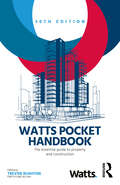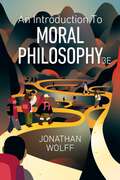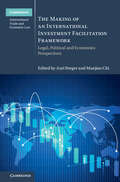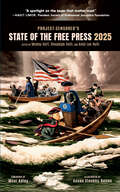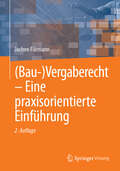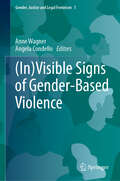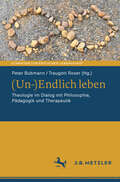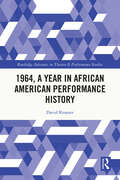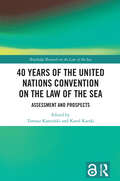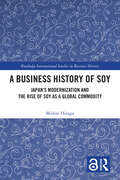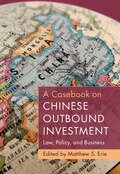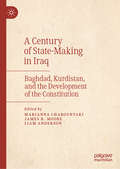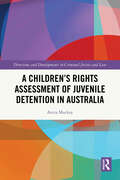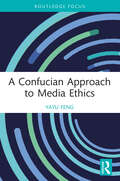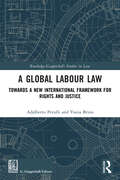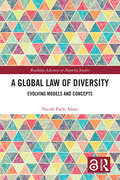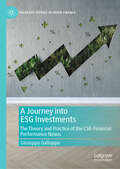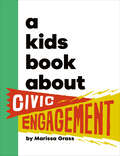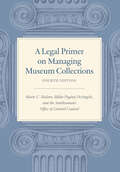- Table View
- List View
Watts Pocket Handbook: The Essential Guide to Property and Construction
by Trevor RushtonThis milestone 30th edition of the Watts Pocket Handbook has had a thorough overhaul and renews its commitment to share industry knowledge by providing technical and legal information across a comprehensive spread of property and construction topics.The Handbook provides specialist information and guidance on a vast selection of related subjects including: Environmental and sustainability issues; Contracts and procurement; Design and construction; Health and safety; Regulations and standards; Legal issues and insurance; Facilities management; Materials and defects; and Technology, innovation and the future. Watts Pocket Handbook remains the must-have reference book for professionals and students engaged in construction, building surveying, services engineering, architecture, project management, facilities management, quantity surveying, property development and much more.
An Introduction to Moral Philosophy (Third Edition)
by Jonathan WolffEmpower students to think critically about ethical theories and moral dilemmas. From his influential scholarship to his popular writings to his appearances on the BBC, Jonathan Wolff has a knack for making moral philosophy vivid and exciting for any audience. In An Introduction to Moral Philosophy, he wields this talent to deliver a text that students enjoy reading. In addition to surveying the basics of ethical theory and critical thinking, Wolff guides students through debates about some of today’s most urgent moral issues, including the ethics of race, gender, artificial intelligence, and public health. The text invites students to think for themselves about real-world issues and provides them with an accurate, appealing sense of what moral philosophy is all about. This purchase offers access to the digital ebook only.
The Making of an International Investment Facilitation Framework: Legal, Political and Economic Perspectives (Cambridge International Trade and Economic Law)
by Manjiao Chi Axel BergerThis book comprehensively investigates the rationale and effects of the first multilateral agreement on investment facilitation for development, including the interests of key WTO members. It adopts a multidisciplinary, transregional and data-driven approach to explore the political, economic and legal aspects pertaining to the most recent WTO agreement. The book highlights how this agreement broadens the scope of the WTO to the contentious area of foreign investment and adopts the innovative facilitation approach. The book presents cutting-edge research on the (non-)adoption of investment facilitation worldwide, the economic impact of the agreement, its legal implications and the political economy explaining why the investment facilitation for development agreement came about. The book brings together leading experts from various disciplines and practices and aims at inspiring more substantive research in this new field of international economic rule-making. This title is also available as Open Access on Cambridge Core.
Project Censored's State of the Free Press 2025
by Mickey Huff Andy Lee Roth Shealeigh VoitlHighlighting the year&’s most significant independent journalism—including reports on toxic chemicals, climate disinformation, and union victories—Project Censored&’s State of the Free Press 2025 illuminates issues and raises voices that the establishment press have throttled.State of the Free Press 2025 shows how independent journalism can promote civic engagement and reconnect people who have otherwise lost interest in sensational &“news&” that distracts and polarizes us.Balancing critical analysis with optimistic vision, the book&’s diverse contributors champion press freedom and critical media literacy to hold the powerful accountable and promote a more just and inclusive society.State of the Free Press 2025 is a joint production of The Censored Press and Seven Stories Press.
(Bau-)Vergaberecht – Eine praxisorientierte Einführung
by Jochen FürmannDieses Fachbuch liefert einen eng an die Bedürfnisse der Praxis orientierten Ein- und Überblick zum weiten Feld des Bau-Vergaberechts. Mit wesentlichen Basisinformationen speziell für den Bauvergabebereich sollen insbesondere Nicht-Juristen einen leichten Einstieg in die Materie erhalten. Das Buch stellt dar wer, warum, was wie ausschreiben muss. Dabei werden auch die haushaltsrechtlichen Vorgaben, die Rechtsschutzmöglichkeiten, die weiteren vergaberechtlich relevanten Fragen während der Bauabwicklung und die übrigen Vergabevorschriften angesprochen. In der 2. Auflage werden die Schwellenwerte und Statistiken aktualisiert. Zudem werden nun auch die Wertgrenzen im Unterschwellenbereich sowie die eForms-Vorschriften umfassend dargestellt.
**Missing** (Gender, Justice and Legal Feminism #1)
by Anne Wagner Angela CondelloThe edited volume explores the causes, forms, and cultures of gender-based violence in society, including how children are educated, how games, art and even language promote differences, stereotypes, neutrality between men and women. It is a place to reflect on the growing importance of tolerance, diversity and acceptance of others. The book focuses on many facets, whether in a confined or public space, with a series of empirical and theoretical chapters from around the world. The volume provides key contemporary commentary on the changing dynamics of gender-based violence. It unveils a range of contexts and spaces in which gender-based violence happens, showcasing its scale and impact worldwide. The discussions presented in the book encourage a critical reflection on the global pandemic of gender-based violence, prompting a vital question about the sufficiency and effectiveness of responses to this global crisis (Professor Olga Jurasz, The Open University Law School).
**Missing**: Theologie im Dialog mit Philosophie, Pädagogik und Therapeutik (Schriften zur Kritischen Lebenskunst)
by Peter Bubmann Traugott RoserDer Begriff ‚Lebenskunst‘ ist in der Beratungsliteratur, Praktischen Philosophie und theologischen Fächern schnell populär geworden. Aber kann er auch in interdisziplinärer Zusammenarbeit als Leitkategorie dienen? Dieser Band fragt im Gespräch mit Philosophie, Pädagogik und Therapeutik und in ökumenischer theologischer Kooperation nach der Tragfähigkeit des Lebenskunstkonzepts. Damit findet zum ersten Mal in der deutschsprachigen Wissenschaft ein vertiefter Austausch zwischen theologischen und kulturwissenschaftlichen bzw. philosophischen Ansätzen einer Theorie der Lebenskunst statt. Der Band richtet sich an alle, die theoretisch wie praktisch an Fragen der Lebenskunst und an ihrer theoretisch-konzeptionellen Vertiefung interessiert sind. Diskutiert wird, was Theologie in die Lebenskunstdiskurse und die konkreten Fragestellungen einer Alltagsethik einzubringen hat und wo sie von den kulturwissenschaftlichen Lebenskunstdiskursen lernen kann. Wo gibt es Brücken zwischen therapeutischen Lebenskunstansätzen und christlicher Seelsorge? Wie wird Kunst theologisch wahrgenommen und was bedeutet das für ein Lebenskunstdenken? Ein eigener Akzent liegt auf der Klärung von Gender-Fragen und sexueller Identität und auf der Bedeutung transhumaner Vorstellungen von Lebenskunst(-hilfe), etwa durch Robotik und KI. Wie Lebenskunst zu erlernen wäre, ist Gegenstand eines Dialogs zwischen Vertretenden der Allgemeinpädagogik und der Religionspädagogik.
1964, A Year in African American Performance History (ISSN)
by David KrasnerThis book examines the Civil Rights Movement from the perspective of a single year, 1964.The book analyses specific events that occurred in 1964 as benchmarks of the Civil Right Movement, making the case that 1964 was a watershed year. Each chapter considers individually politics, rhetoric, sports, dramatic literature, film, art, and music, breaking down the events and illustrating their importance to the social and political life in the United States in 1964. This study emphasizes 1964 as a nodal point in the history of the Civil Rights Movement, arguing that it was within this single year that the tide against racism and injustice turned markedly.This book will be of great interest to the scholars and students of civil rights, theatre and performance, art history, and drama literature.
38 Londres Street: On Impunity, Pinochet in England and a Nazi in Patagonia
by Philippe SandsIn 38 Londres Street, Philippe Sands blends personal memoir, historical detective work and gripping courtroom drama to probe a secret double story of mass murder, one that reveals a shocking thread that links the horrors of the 1940s with those of our own times. The house at 38 Londres Street is home to the legacies of two men whose personal stories span continents, nationalities and decades of atrocity: Augusto Pinochet, President of Chile, and Walther Rauff, a Nazi SS officer responsible for the use of gas vans.On the run from justice at the end of the Second World War, Rauff crosses the ocean to southern Chile. He settles in Punta Arenas, Patagonia, managing a king crab cannery at the end of the world. But there are whispers about this discreet and self-possessed German - rumours of a second career with Pinochet's secret intelligence service, the dreaded DINA.In 1998, Pinochet is in a London medical clinic when the police enter his room and arrest him on charges of crimes against humanity and genocide. Philippe Sands is called to advise the former head of state on his claim to immunity, but will instead represent a human rights organisation against him. Years later, Sands makes a discovery while working on another book which reignites his interest in the case and leads to a decades-long investigation into Pinochet's crimes, his unexpected connection to Rauff and the former Nazi's possible connection to Chile's disappeared.
38 Londres Street: On Impunity, Pinochet in England and a Nazi in Patagonia
by Philippe SandsIn 38 Londres Street, Philippe Sands blends personal memoir, historical detective work and gripping courtroom drama to probe a secret double story of mass murder, one that reveals a shocking thread that links the horrors of the 1940s with those of our own times. The house at 38 Londres Street is home to the legacies of two men whose personal stories span continents, nationalities and decades of atrocity: Augusto Pinochet, President of Chile, and Walther Rauff, a Nazi SS officer responsible for the use of gas vans.On the run from justice at the end of the Second World War, Rauff crosses the ocean to southern Chile. He settles in Punta Arenas, Patagonia, managing a king crab cannery at the end of the world. But there are whispers about this discreet and self-possessed German - rumours of a second career with Pinochet's secret intelligence service, the dreaded DINA.In 1998, Pinochet is in a London medical clinic when the police enter his room and arrest him on charges of crimes against humanity and genocide. Philippe Sands is called to advise the former head of state on his claim to immunity, but will instead represent a human rights organisation against him. Years later, Sands makes a discovery while working on another book which reignites his interest in the case and leads to a decades-long investigation into Pinochet's crimes, his unexpected connection to Rauff and the former Nazi's possible connection to Chile's disappeared.
40 Years of the United Nations Convention on the Law of the Sea: Assessment and Prospects (Routledge Research on the Law of the Sea)
by Tomasz Kamiński Karol KarskiThis book discusses contemporary challenges within the law of the sea, a domain of international law extensively codified in United Nations Convention on the Law of the Sea.Given the considerable time elapsed since the convention’s adoption and nearly three decades of its implementation, the book analyses the interplay and influence of its provisions on international customary law, as well as to identify issues arising from its application. The book explores and discusses crucial aspects of the law of the sea, addressing challenges and future perspectives related to UNCLOS provisions, such as the delimitation of maritime areas, maritime security, safety, environmental protection, and the implications of advancing technologies, particularly in the realm of unmanned vessels. Additionally, the book delves into recent maritime legal challenges arising from the conflict in Ukraine and the global impact of the COVID-19 pandemic.The book will be of interest to students and scholars in the field of the law of the sea, international relations and international law.The Open Access version of this book, available at http://www.taylorfrancis.com, has been made available under a Creative Commons Attribution-Non Commercial-No Derivatives (CC-BY-NC-ND) 4.0 license.
A Business History of Soy: Japan’s Modernization and the Rise of Soy as a Global Commodity (Routledge International Studies in Business History)
by Midori HiragaThis is a business history of soy that reveals how Japanese imperial and military institutions and financial-mercantile-industrial interests created a role for soy as a versatile raw material and global commodity beginning in the 19th century, even before the Western world recognized this “oilseed.” Originating in the rich food cultures of Asia, soy is praised as the “magic bean.” About 360 million tons are produced in the world today, and it is traded globally to become food, feed, and fuel. It is the second largest source of vegetable oil in the world, and soy meal is an essential feed without which the modern livestock industries could not exist. Its dominance today is often accounted for in terms of its versatile nature. This book, however, argues that soy was transformed into a versatile industrial raw material and global commodity through the political-economic strategies of state and business actors engaged in the development of the capitalist world-economy. By studying little-known Japanese historical documents and corporate records, and focusing on the less-researched vegetable oil and industrial uses of soy, this book provides a better understanding of how this traditional Asian food was transformed into a global commodity embedded in contradictions. Promoted as a healthy and sustainable food source, soy is also a destructive cash crop whose cultivation and use have played a significant role in the current climate crisis. Based on this case of soy, the book provides a structural understanding of broader food and agriculture systems in the history of capitalism, making it of interest to students at an advanced level, academics, and researchers in the fields of business history, corporate governance, Japanese business, as well as the political economy of food and agriculture.Chapters 2, 3, and the Conclusion of this book are freely available as a downloadable Open Access PDF at http://www.taylorfrancis.com under a Creative Commons Attribution-Non Commercial-No Derivatives (CC BY-NC-ND) 4.0 license.
A Casebook on Chinese Outbound Investment: Law, Policy, and Business
by Matthew S. ErieChina remains one of the top capital exporters in the world, yet there is a paucity of reliable sources through which to assess Chinese corporate decision-making, the implementation of Chinese-financed and managed projects, and the socio-economic effects of those projects. The Casebook fills this gap by providing fifteen case studies written by experts and researchers, many from host states and who have first-hand knowledge of the transaction or dispute in question. Case studies are written primarily based on primary source material including transactional documents, interviews with stakeholders, laws and regulations, and case decisions. Educators in professional schools, including law, policy, and business, will find in the Casebook material to supplement class discussions pertaining to Chinese overseas investment, Chinese investment strategies, and the nature of the Chinese firm. This title is also available as open access on Cambridge Core.
A Century of State-Making in Iraq: Baghdad, Kurdistan, and the Development of the Constitution
by Marianna Charountaki James R. Moore Liam AndersonAs an interdisciplinary publication, this book will have a strong international appeal to those across the Middle East who are interested in the complex issues of state-building, democratic transitions and federalism. It will also appeal to the many scholars in North America and Europe engaged in the study of these questions. The search for just and stable constitutional arrangements has been a central feature of political debates in the region and, since the Arab Uprisings, political scientists around the world have focused their attention on changes in the region. Iraq is a fascinating case study of a state that emerged from the mandate system with political institutions derived from Western political ideas, but one where the application of those ideas reflected the historical circumstances and social realities of fragmented community life. Iraq’s political and constitutional problems have been fiercely debated since the Iraq war of 2003, with stuttering attempts to create a new constitutional settlement for Iraq. This book seeks to place these debates in their wider historical and socio-political context and demonstrate how contemporary problems are rooted in Iraq’s political system, state-building processes and unique constitutional past. The volume examines different aspects of Iraq’s struggle to create a coherent state identity through political institutions that can accommodate diversity. This is a topical work with extensive primary-source-based empirical research, alongside the conceptual and theoretical insights offered. Its different approach will be valuable to a variety of audiences, ranging from scholars and students of international politics/relations and law, diplomatic history, and the Middle East, to policymakers and, indeed, beyond to a broader audience of informed non-specialist readers.
A Children’s Rights Assessment of Juvenile Detention in Australia (ISSN)
by Anita MackayCanvassing the socio-legal context for youth detention in Australia with a focus on international human rights law and legal frameworks within Australian states and territories, this book examines the recurring children’s rights-violations of recent years, and puts forward strategies for reform.Providing a comprehensive national picture of juvenile detention legislation, policy and practices using a children’s rights framework, this book is a detailed synthesis of investigatory reports, judicial decisions and inquiries by both Royal Commissions and parliamentary committee inquiries that together establish an evidence base for assessing the compliance of youth detention with Australia’s international and domestic human rights obligations. It also proposes nine pillars for reform to help Australia move towards children’s rights compliance.A Children’s Rights Assessment of Juvenile Detention in Australia provides an invaluable resource for policy-makers, lawyers and criminologists, as well as for students of law and criminology.
A Confucian Approach to Media Ethics (Routledge Focus on Communication Studies)
by Yayu FengA Confucian Approach to Media Ethics offers a comprehensive theorization of an approach to media ethics based on the moral philosophy that originated from China and that profoundly influenced East Asian countries.This book engages with foundational concepts from Confucian ethics and explicates a new framework that can be used for guiding media practices, as well as media ethics research and teaching. It suggests that the Confucian ideals of He (harmony), Zhong (equilibrium), and the notion of Junzi can be applied to guide intercultural media practices, and sets out a fresh model for ethics education centered on Xiuji (self-cultivation) that is different from the training-based and decision-making-centered model prevalent in the Western classrooms. This is also a framework that emphasizes both individual moral growth and the moral character of the broader professional community.Filling a gap in the conversation between Eastern and Western approaches to media ethics, this innovative and important volume will offer new perspectives to students and scholars of media ethics, communication studies, and comparative philosophy.
A Darker Side of Paradise
by R.J. ElloryA brand new thriller from the internationally bestselling author of A QUIET BELIEF IN ANGELS****Rookie police officer Rachel Hoffman has never seen a dead body before.It will not be her last.Her first murder case is a young woman - sent off to sleep with a mysterious note that quotes from an eight-hundred year old book: Dante's Divine Comedy.So begins an investigation that will haunt her for the rest of her life, and lead Rachel on a descent into obsession that upends everything she thought she knew about justice.As the killings unfold over the decades, Rachel's obsession will drive her from small-town America through the streets of NYC, to a revelation that will cost her everything.Because every case she thought she solved was a lie.And the truth is more dangerous than she could have imagined.**** PRAISE FOR R.J. ELLORY 'Beautiful and haunting... A tour de force' MICHAEL CONNELLY 'Beautifully written novels that are also great mysteries' JAMES PATTERSON 'A uniquely gifted, passionate, and powerful writer' ALAN FURST 'In the top flight of crime writing' SUNDAY TELEGRAPH 'The master of the genre' CLIVE CUSSLER
A Darker Side of Paradise
by R.J. ElloryA brand new thriller from the internationally bestselling author of A QUIET BELIEF IN ANGELS****Rookie police officer Rachel Hoffman has never seen a dead body before.It will not be her last.Her first murder case is a young woman - sent off to sleep with a mysterious note that quotes from an eight-hundred year old book: Dante's Divine Comedy.So begins an investigation that will haunt her for the rest of her life, and lead Rachel on a descent into obsession that upends everything she thought she knew about justice.As the killings unfold over the decades, Rachel's obsession will drive her from small-town America through the streets of NYC, to a revelation that will cost her everything.Because every case she thought she solved was a lie.And the truth is more dangerous than she could have imagined.**** PRAISE FOR R.J. ELLORY 'Beautiful and haunting... A tour de force' MICHAEL CONNELLY 'Beautifully written novels that are also great mysteries' JAMES PATTERSON 'A uniquely gifted, passionate, and powerful writer' ALAN FURST 'In the top flight of crime writing' SUNDAY TELEGRAPH 'The master of the genre' CLIVE CUSSLER
A Darker Side of Paradise
by R.J. ElloryA brand new thriller from the internationally bestselling author of A QUIET BELIEF IN ANGELS****Rookie police officer Rachel Hoffman has never seen a dead body before.It will not be her last.Her first murder case is a young woman - sent off to sleep with a mysterious note that quotes from an eight-hundred year old book: Dante's Divine Comedy.So begins an investigation that will haunt her for the rest of her life, and lead Rachel on a descent into obsession that upends everything she thought she knew about justice.As the killings unfold over the decades, Rachel's obsession will drive her from small-town America through the streets of NYC, to a revelation that will cost her everything.Because every case she thought she solved was a lie.And the truth is more dangerous than she could have imagined.**** PRAISE FOR R.J. ELLORY 'Beautiful and haunting... A tour de force' MICHAEL CONNELLY 'Beautifully written novels that are also great mysteries' JAMES PATTERSON 'A uniquely gifted, passionate, and powerful writer' ALAN FURST 'In the top flight of crime writing' SUNDAY TELEGRAPH 'The master of the genre' CLIVE CUSSLER
A Global Labour Law: Towards a New International Framework for Rights and Justice (Routledge-Giappichelli Studies in Law)
by Adalberto Perulli Vania BrinoThis book explores the prospects of a global labour law system. Global labour law is understood as a still non-coherent set ofnorms that at different levels and with different legal effectiveness regulate legal labour relations, promote respect for fundamental social rights, and condition the behavior of the multinational enterprise, from a social justice and sustainability perspective. The book deals with both international labour law and regulatory instruments of different kinds, such as social clauses in international trade treaties or corporate codes of conduct, transnational collective bargaining, and EU directives on due diligence. This complex normative “system” is partly reconstructed and partly subjected to critique, with the aim of producing a hybrid handbook in which the elements of normative knowledge are accompanied by problematic reasoning about the forms, contents and purposes of a possible global labour law. The book will be of interest to academics, researchers and policy-makers working in the areas of Labour Law, Employment Law, International Human Rights Law and Social Justice.
A Global Law of Diversity: Evolving Models and Concepts (Routledge Advances in Minority Studies)
by Nicolò Paolo AlessiThis book provides a global perspective on the accommodation of diversity within constitutional traditions, considering the most innovative approaches and legal instruments of the Global North and Global South. This field of study, traditionally dominated by a Global North approach based on majority-minority and rights-based discourse, is undergoing significant development. The work thus assesses the appropriateness of the existing mainstream theoretical tools and concepts – in particular minority and minority-related concepts as well as rights discourse – to grasp the ongoing evolution of this field of law. A reconsideration of the traditional conceptual categories and the introduction of the concept “Law of Diversity” is proposed as a theoretical framework to grasp the ongoing developments in this area. Among the models studied, those that are referred to as emergent models for the accommodation of diversity in the Global North appear to be particularly in need of theoretical recognition. To this end, the theory of federalism is used to serve a rather unexplored theoretical function. Federal theory is put forward as a theoretical instrument to frame and explain the emergent instruments for the accommodation of diversity, as well as provide practical solutions for their development. The book will be of interest to researchers, academics, and policy-makers working in the areas of comparative constitutional law, minority and indigenous rights law, and federal studies.The Open Access version of this book, available at http://www.taylorfrancis.com, has been made available under a Creative Commons Attribution-Non Commercial-No Derivatives (CC-BY-NC-ND) 4.0 license.
A Guilty Woman
by Charlotte BarnesThe truth is sometimes darker than fiction, in this gripping psychological thriller from the author of My Husband the Murderer. When Caroline walks into the bustling hotel bar on a Friday afternoon, no one could have predicted what is about to unfold. With chilling precision, she pulls out a gun and shoots her lover five times in cold blood. The crime, committed in plain sight, leaves no room for doubt—Caroline is guilty. But when questioned, she offers no explanation and refuses to comment. As the case explodes across media outlets, a popular true crime podcast begins to dig deeper into Caroline&’s life. Soon, Caroline&’s uncovered writing becomes the key to understanding her past—and potentially, the dark secrets she has yet to reveal. As her attorney scrambles to defend her, one question lingers: What happens when a killer rewrites their own story? And when her trial approaches, whispers grow about a manuscript she&’s writing from prison—one that might reveal far more than anyone expected . . .A Guilty Woman is perfect for fans of true crime, thrillers, and dark literary mysteries.
A Journey into ESG Investments: The Theory and Practice of the CSR-Financial Performance Nexus (Palgrave Studies in Impact Finance)
by Giuseppe GalloppoThis book deals with climate finance and presents a balance between the theoretical framework—as drawn by the most widely cited practitioner-oriented and academic journals in environmental management—and experimental finance. Does sustainability work eventually? This book explores the data from empirical analysis to address this question. The book investigates the effectiveness of Corporate Social Responsibility and its empirical verification by analyzing the correlation between firm-specific ESG characteristics and financial performance, and will be of interest to academics, researchers, and practitioners of sustainable finance and climate finance.
A Kids Book About Civic Engagement (A Kids Book)
by Marissa GrassWhat is something that makes your community special? What’s one thing you’d change to make your community even better? Improvements and growth in the places we live are made possible through civic engagement. Learn more about civic engagement and how to get active in your community. Big decisions are made all the time, and your voice matters in those discussions.
A Legal Primer on Managing Museum Collections, Fourth Edition
by Marie C. Malaro Ildiko DeAngelis SI Office of General CounselA new edition of the bible of U.S. collections management—now updated for the 21st-century museum professional or Museum Studies student!This is the only comprehensive discussion of the legal questions faced by museums as they acquire, use, and refine their collections.This fully revised and expanded fourth edition addresses a thorough range of legal developments museums face, including new developments in the digital age and under new repatriation regulations. This approachable, easy-to-follow guide provides:Major updates on deaccessioning and copyright and fair useNew chapters on ethical returns and shared stewardship Real-life and hypothetical lawsuit case studiesSamples from museum collection policies Templates to help with document writingSuggestions for preventing legal problemsFootnotes with more indepth discussion of relevant casesThe book covers a wide range of issues, including nonprofit status, fraud, copyright, loans, documentation, accessioning and deaccessioning, international exhibitions, and cultural heritage concerns. The authorative A Legal Primer on Managing Museum Collections offers detailed explanations of the law that make it a go-to book for any museum professional.
